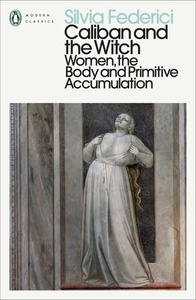Take a photo of a barcode or cover
3.75
Super informativo e dettagliato, per me (lo sottolineo) un po' troppo. Sarà che i saggi non mi entusiasmano mai così tanto, ma l'ho trovato troppo pieno di dettagli e informazioni. L'argomento assolutamente interessante, ma della caccia alle streghe si parla troppo poco, mentre la parte dedicata al capitalismo è un po' troppo larga (e noiosa). Però è solo il mio parere personale di gusto, riconosco che comunque è un libro completo e molto istruttivo, e ha un sacco di spunti interessanti.
Super informativo e dettagliato, per me (lo sottolineo) un po' troppo. Sarà che i saggi non mi entusiasmano mai così tanto, ma l'ho trovato troppo pieno di dettagli e informazioni. L'argomento assolutamente interessante, ma della caccia alle streghe si parla troppo poco, mentre la parte dedicata al capitalismo è un po' troppo larga (e noiosa). Però è solo il mio parere personale di gusto, riconosco che comunque è un libro completo e molto istruttivo, e ha un sacco di spunti interessanti.
emotional
informative
inspiring
reflective
tense
slow-paced
challenging
informative
slow-paced
I enjoyed reading the content of the book itself, but found that many ideas could be said more simply. I find it interesting that someone writing about working class politics, and someone who has so much to say against Marx, would write in such a way that an actual working class person likely would never have time to read it (i.e. she did the same thing Marx did). At the same time, it's a must-read.
challenging
informative
inspiring
medium-paced
A very unusual book for me to check out, but I am impressed! Interesting take on Herstory as well as a lot of very interesting data. Definitely a surprise!
Penso che Calibano e la strega sia uno dei saggi più completi che abbia mai letto, più vicino ad un manuale universitario nella formulazione che ad un vero e proprio saggio. Questo libro dovrebbe essere letto da tutt*, indipendentemente dal genere e dalle opinioni personali, perché spiega nel modo più completo possibile il rapporto tra capitale, donne e accumulazione originaria attraverso un percorso storico supportato da sempre da fonti dettagliate, fornendo così un apporto informativo molto ricco. Sicuramente tale saggio non è sempre immediato nella fruizione e non sono d'accordo con tutte le opinioni della Federici, anzi, però è inevitabile che sia così. Va letto.
It was a very fascinating study of the later medieval period and how all the actions against the peasantry eventually led to the witch trials. And how the witch trials dragged women down so far we still haven't recovered from it in modern times.
For a book that talks about focusing on the Witch Trials, the first half of the book is more of a background/build-up to them. I did not mind this, but I do love history so getting to know so much about medieval Europe was really fun for me. It was very inspiring but also depressing to read about how hard Europeans were fighting against Capitalism. They were trying so hard just to get massacred over and over. Also interesting to read about how white indentured servants and African & Indigenous slaves were originally allies and friends. Until the whites were separated and started to think of themselves as better.
The chapter about the New World was also very interesting. I would have liked to see it expanded slightly to see how the witch trials affected the colonization of Polynesia and Australia and the treatment of women there.
One issue I did have was the "The Great Caliban" section, it is mostly just a philosophical chapter about what counts as a body and various philosophical dialogues going on at the time. I'm sure it was interesting to some, but to me I honestly skimmed the latter half of that section. It just felt like it was covering the same ground over and over.
4.5/5 stars because it is interesting and paints a very solid picture of the era. It lost a star mostly for the extremely long build up (while fascinating) it doesn't feel like it focuses on the main chunk that is brought up over and over gain. The
For a book that talks about focusing on the Witch Trials, the first half of the book is more of a background/build-up to them. I did not mind this, but I do love history so getting to know so much about medieval Europe was really fun for me. It was very inspiring but also depressing to read about how hard Europeans were fighting against Capitalism. They were trying so hard just to get massacred over and over. Also interesting to read about how white indentured servants and African & Indigenous slaves were originally allies and friends. Until the whites were separated and started to think of themselves as better.
The chapter about the New World was also very interesting. I would have liked to see it expanded slightly to see how the witch trials affected the colonization of Polynesia and Australia and the treatment of women there.
One issue I did have was the "The Great Caliban" section, it is mostly just a philosophical chapter about what counts as a body and various philosophical dialogues going on at the time. I'm sure it was interesting to some, but to me I honestly skimmed the latter half of that section. It just felt like it was covering the same ground over and over.
4.5/5 stars because it is interesting and paints a very solid picture of the era. It lost a star mostly for the extremely long build up (while fascinating) it doesn't feel like it focuses on the main chunk that is brought up over and over gain. The
Es un gran libro no solo sobre la caza de brujas visto históricamente sino las causas que la hicieron y mantuvieron posible así como su relación con la política y economía a nivel mundial incluso en nuestros tiempos. Me encantó la manera tan clara de escribir de Federici, llena de referencias y de reflexiones sobre un tema tan importante y que parece tan lejano y que sin embargo tuvo reoercuciones que hasta la fecha sin visibles en la sociedad de varios países.







